Local marketing uses a combination of Internet marketing techniques to tap into the ever-growing local search and social media tools to help businesses in your area connect with new customers.
This article explores various local marketing services that businesses could see value in engaging with an external agency.
The goal isn’t just to get customers, but also to foster brand advocates–customers who are so enthusiastic about your product or service that they become passionate advocates, recommending you through word of mouth, social media and review sites.
It’s in high demand right now especially in a post-COVID environment where a lot of the interactions take place online. We are seeing more local businesses now shift focus to local marketing services to capitalize on this opportunity.
It’s quite a specialized field and it can be a lot for local business owners to get their head around.
As such, it’s very common for local businesses—even those with multiple locations—to seek to outsource this part of their marketing to trusted experts in the field. And there’s certainly no shortage of those.
Is local marketing similar to SEO?
Well, yes and no!
Both traditional and local SEO focus on improving your rankings in online search results so more people can find, contact, and purchase from your business. Traditional SEO strategies typically aim for large-scale visibility among internet users worldwide.
Local marketing services, however, allow you to capture local search territory to connect with searchers within a certain geographical area. It’s more suited for businesses that want to dominate a local audience.
Understanding what’s offered by these services may be difficult for some businesses to grasp at first so I’ll try to give a little insight below.
What local marketing services can you offer?
1. Local competition analysis
What is it?
Local competition analysis involves a thorough evaluation of competitors of a local business. It will form the basis of making decisions that will help you outperform your competition and rank higher on local searches.
It helps the business understand the local market better, the level of competition involved, and the competitor’s strengths and weaknesses. This forms the foundation for all the business decisions that prospective clients can take.
What’s involved?
- Conduct a standard Google search of local competitors in the area offering similar services.
- Curate a list of companies that are ranking in the local pack and take measures to outrank them.
- Research competitor backlink profiles to identify the backlinks that point to individual pages that are outranking yours in local SERP.
- Conduct competitive keyword research to identify which keywords the competitors are targeting.
- Evaluate the on-page SEO elements such as titles, meta descriptions, Alt tags and slugs that are used by the competitors.
- Identify the list of directories and citations that the competition has used.
- Understand the local competitive landscape and prepare a report that lists the recommended actions businesses should take.
Tools you could use
- Ahrefs: use the Content gap tool to find relevant keywords that competitors rank for.
- SpyFu: identifying search marketing strategies adopted successful competitors
- SimilarWeb: analyze competitor’s marketing and acquisition strategies
- BuzzSumo: identify competitor content and brand mentions to analyze what works.
- LowFruits: identify low competition keywords that your clients can easily target.
2. Optimized websites for local search
What is it?
Offering website designs optimized for local searches is one of the most sought after local marketing services for most businesses. This involves developing a website for local search that loads quickly, optimized for mobile and follows the best practices for local web design.

It is essential for dominating success online, and it’s not something that needs to be complicated. It includes strategies that customize a website to effectively communicate with a local audience and reflects appropriate cultural values in each region.
By including city/state information, you can make sure that your website will come up when people looking for products and services like yours are searching in that area.
What’s involved?
Broadly, it involves the process of conducting in-depth keyword research to determine how exactly potential customers search for businesses online.
By using the correct local keywords, you will offer local businesses the opportunity to rank high for local online searches which can in turn increase their exposure.
Additionally, you will adjust the content and metadata of the website to include the city, county or region in a natural manner. This will help search engines to show up the website in local search results.
Most importantly, you will include the following key local business information on the website:
- Business name, address, phone number (NAP)
- Opening hours
- Accreditations, certifications, and guarantee
- Reviews and testimonials
- Services or products you offer
- Working locations
- An embedded map
- Payment methods accepted
- Parking info
Ultimately, the websites will have the unique ability to attract the right visitors who are more likely to convert into paid customers.
Tools you could use
- WordPress or Webflow: to build websites and a content management system
- Yoast or RankMath: to easily handle on-page and local SEO elements.
3. Local Content Marketing
What is it?
Local content marketing is all about targeting a specific geographical area with localized content. They should be relevant, unique and interesting to people in the target area. Just like we are unique individuals, each region and city has unique characteristics.
It closely ties in with offering websites optimized for local searches that was explained in more detail above.
What’s involved
Let’s illustrate with an example. If your client “ABC Plumbing” operates a local plumbing service, their potential customers may use the Internet to search for things like “how to fix the kitchen sink” or “cost of replacing a water tank”.
Through local content marketing, you will generate answers to these questions so the website will rank high for these search queries. These potential customers will look at ABC Plumbing as a valuable source of information – and may even get in touch with them to get their kitchen fixed.
Tools you could use
- Google Keyword Planner: for keyword research.
- AnswerThePublic: to identify what types of questions are commonly asked.
- Google Sheets, Notion or Trello: to manage content topics and calendar.
- Google Analytics: to track which content is gaining the most visits based on location.
- Grammarly: for editing and proofreading content pieces before publication.
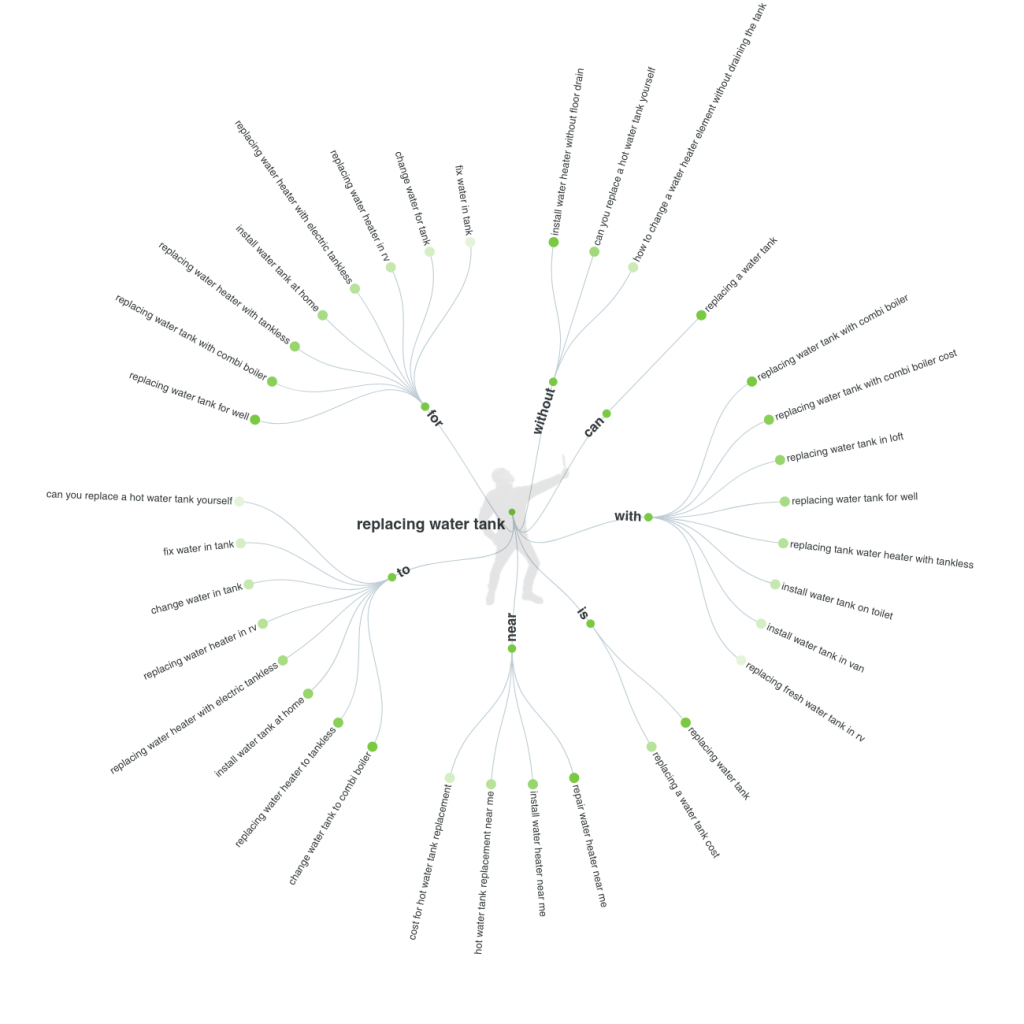
Local Email Marketing
What is it?
Local email marketing is the process of sending emails to potential customers, who have either signed up for your newsletter or purchased something from your website.
These emails should be sent with the goal of encouraging those prospects to visit your store again, engage with your business in some way, purchase more products or book more services with the company.
This can be used along with other local marketing services to further enhance the businesses’ local footprint.
What’s involved?
Broadly, local email marketing involves implementing strategies that help local businesses get more prospects to sign up for promotions, offers and newsletters by offering them an incentive.
You will help local businesses grow their email list, set up the system to capture this list, draft the email campaign strategy, design emails and newsletters, send emails to the subscribers either manually or through automations and finally optimize these campaigns through A/B testing.
There are many ways to build an email list (both online and offline) and each strategy would differ across the sectors that the local businesses operate in. You will come in here to advise them on the ones that work best for their business.
For example, if you’re offering local email marketing services to a tradesmen, you could incentivize prospects to sign up for their newsletter by offering free on-site inspection for their next job.
Tools you could use
- MailChimp, MailerLite or ActiveCampaign: for automate email marketing
- Canva: For graphics to include in newsletters
- Google Workspace: For customized email addresses to match the domain for better credibility and email delivery.
5. Local PPC
What is it?
Local PPC refers to paid online marketing campaigns that help local businesses reach customers in their local market. The strategy involves using local keywords and geotargeting with a specific region to run.
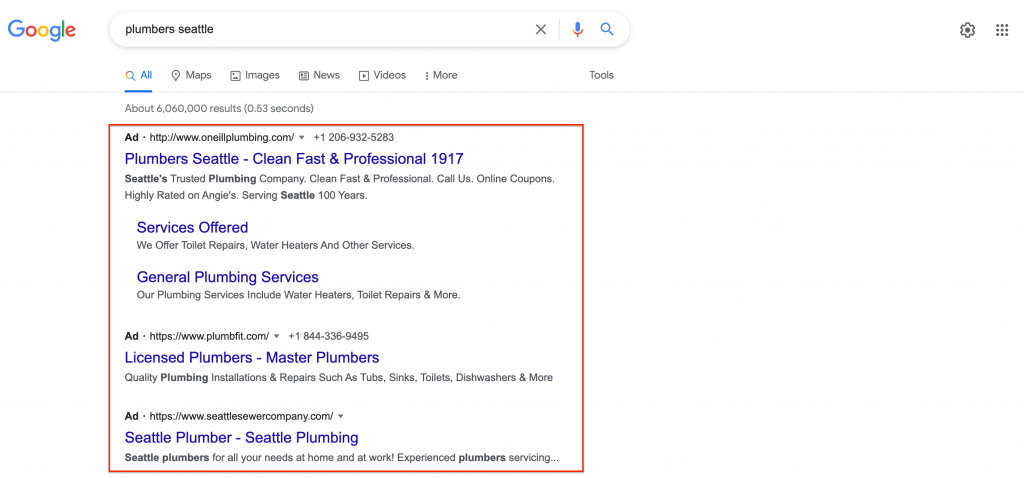
With local PPC, you can help local businesses with running relevant ads to increase brand awareness, improve conversions, and create campaigns optimized for target locations. It’s a great way to kick start any business especially if the clients want immediate results.
For example, Google Ads allows you to reach potential customers that are geographically relevant to your business, which can help improve ROI.
What’s involved
Depending on the scope of your skillset, you can offer local businesses a choice of ad platforms that you want to use, i.e. Google Ads, Bing Ads, Yelp Ads etc.
However the following tasks relating local PPC generally apply across any platforms that you choose:
- Conduct keyword research on the most appropriate search terms/queries to target.
- Create and formulate ad creatives that are suited for the local audience.
- Monitor the performance of the different campaigns and optimize the marketing spend accordingly.
- Include relevant CTAs that maximize the number of leads generated through ads.
- Constantly work towards maintaining the Ad quality score to improve the cost per click.
- Provide reports on the Ad campaigns highlighting key metrics.
Tools you could use
- Google Ads: launch search, display, video and app ads on Google’s network.
- Yelp Ads: ideal for targeting visitors looking to work with local businesses
- Hubspot’s PPC templates: useful for creating processes around creating ads for clients.
- Agency Analytics: A reporting tool to showcase PPC campaigns. Has a feature to include PPC markups too.
- iSpionage: explore profitable PPC keywords for campaign and evaluate the effectiveness of ad copy
6. Local Social Media Ads & Management
What is it?
Local social media management is the process of creating, publishing, and analyzing content on social media channels such as Instagram and Facebook on behalf of local businesses. You could extend this service by offering to manage Social Media Ad campaigns for various platforms as well.
What’s involved?
As noted above, this can be served as two distinct services; social media management and social media ads management. The tasks involved (though inter-related) can vary on an operational level:
Social Media Management tasks for local businesses involve (but not limited to):
- Advise on the right channels to use based on their target market based on surveys and social media mapping.
- Optimize the profile with updated information such as business name, contact information, category, opening hours, price range, website URL etc.
- Build an audience on the chosen channels by creating and publishing relevant content. The approach can vary across platforms.
- Build communities by sharing valuable content relevant to the business operations.
- Share updates on new services offered, promotions to keep the audience engaged.
- Manage reviews on social platforms and encourage past customers to post recommendations.
- Using insights to understand when the audience is most active.
- Create a social media content calendar to schedule and publish posts on various channels.
Social Media Ad Management tasks for local businesses involve (but not limited to):
- Strategize and create a well targeted audience based on demography, geography and various interests
- Create and design ad creatives to run campaigns on behalf of the business
- Analyze key metrics to assess which campaigns are performing and better and continuously optimize them.
- Experiment and run campaigns with different objectives to determine which works best.
- Run location-based targeted ads for local visibility and increasing foot traffic.
Tools you could use
- Sprout Social: all-in-one social media management platform
- Buzzsumo: to gather social media insights
- Mention: social monitoring tool to identify when a client’s business is mentioned anywhere online (such as blogs, posts, reviews etc.)
- Planable: Schedule and create content calendars for social media posts
7. Google Business Profile Management
What is it?
For almost all local businesses, setting up Google Business Profile (GBP) is mandatory for local marketing success. The objective here is to rank high in the local pack to ensure the business is getting found by prospects searching for the services or products.
For example, if your client operates an Italian restaurant, you would optimize their GBP listing to show up for such search queries like “Italian restaurants near me” or similar within a specific location.
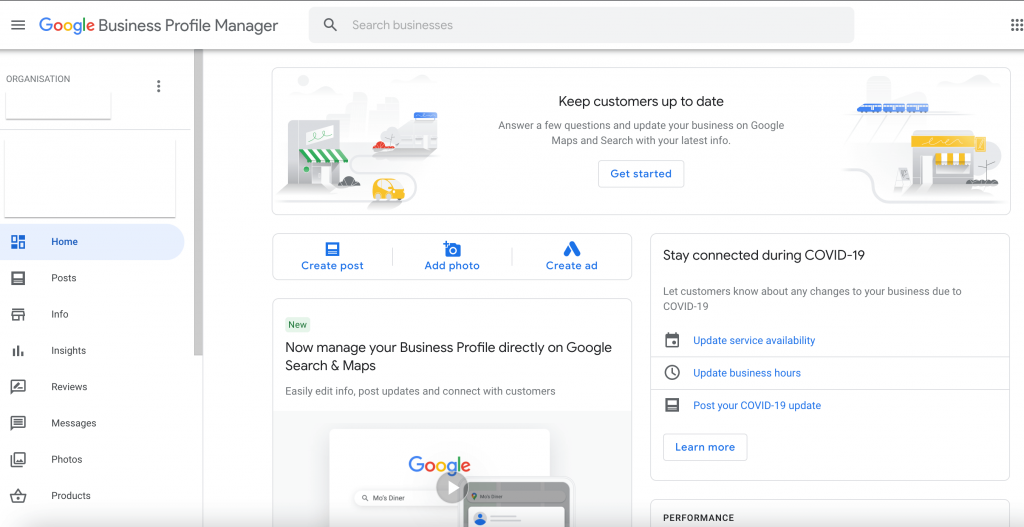
Also, GBP makes it easy to share information about your business with your customers. With features like Q&As, Google Posts, and Google Reviews, you can engage with visitors to your website, build trust, and drive them back in store or onto your website.
In other words, it helps people find local businesses more easily, which can increase site traffic and eventually generate more sales for your clients.
What’s involved?
- If there’s an existing listing, ensure it’s claimed by the owners of the business and conduct a GBP audit to identify what needs done.
- Take measures to optimize the GBP listing by setting the right categories, including the correct NAP information etc.
- Identify local online competitors and analyze the status of their GMB listings.
- Perform local keyword research to include in the content and optimize the listing.
- Create and post relevant content that provides information targeted to your audience.
- Manage online reputation by responding to reviews.
- Track and report key metrics for Google Business Profile such as calls, request for directions, profile visits etc.
Tools you could use
- MyWebAudit: to conduct an audit for existing Google Business Profiles.
- NapoleonCat’s Social Inbox: manage all your social interactions – including Google reviews – in one dashboard
- OneUp: platform to schedule GBP posts and plan the content schedule.
8. Google Local Service Ads Management
What is it?
Similar to local PPC, Google Local Service Ads (GLSA) is a specialized Ad product that lets local businesses connect with potential customers who search on Google for the services you offer. You can package this local marketing service along with PPC campaigns as they quite similar.
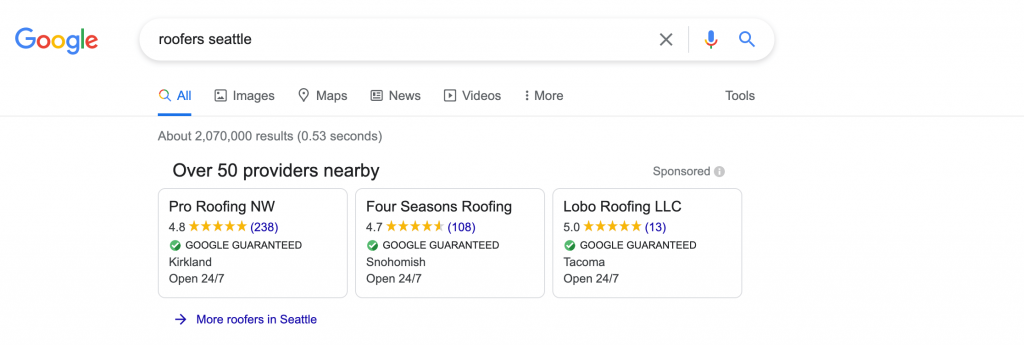
The ads will show up for customers in the target area, and the client will only pay if a customer contacts you directly through the ad.
It’s more suited for service based businesses as it allows for customers to book local jobs that can fill up the calendar.
What’s involved?
- Apply for the program by providing relevant details of the local business such as required license information, background check materials, and online checks.
- Obtain a Google Guarantee which can help improve credibility and trust among prospects.
- Setup the listing and optimize for local ads.
- Manage budgets to ensure you maximize the return on ad spend (ROAS)
- Setup billing profile and manage payments for incoming leads.
- Report on ad performance to tweak and optimize the ads for better conversions.
Tools you could use
This is a specialized platform and you will therefore only need an active Google Ads account and a GLSA account.
9. Local Citations Management
What is it?
Citation building is the process of getting local business data such as NAP, into different local business directories, review sites and more. Each listing that you publish is known as a ‘citation’.
The important thing to remember is that these citations are all considered as signals to search engines – increasing the confidence they have in your business data. This in turn can improve your rankings in local SERPs (Search Engine Results Pages).
What’s involved?
There are many citations with some focusing on particular areas or industries. The objective of citations management is therefore to learn more about the client, identify which of these citations are most suited for the local business and build listings on the shortlisted ones first.
The next step would be to monitor and manage them to ensure the data is consistent with other key local information and update if necessary. It’s a monotonous task but one that can contribute significantly towards local rankings.
Tools you could use
- Whitespark: The “local citation finder” tool that helps you find citations, add the listing on these citations and easily manage in one dashboard.
- Brightlocal: Similar to Whitespark, it’s a comprehensive tool that finds and builds listings relevant to the industry and location.
10. Local Reputation Management
What is it?
Local reputation management is the process of managing the public perception of a particular business within a specific location.
It allows you to monitor what’s said and done about the local business in popular search engine results on Google and social network sites like Facebook, Twitter and LinkedIn.
A few bad reviews or a negative story may mean lost sales or expenses associated with resolving a crisis in public relations. It’s therefore important that it’s actively managed to ensure they are addressed on time and in a correct manner.
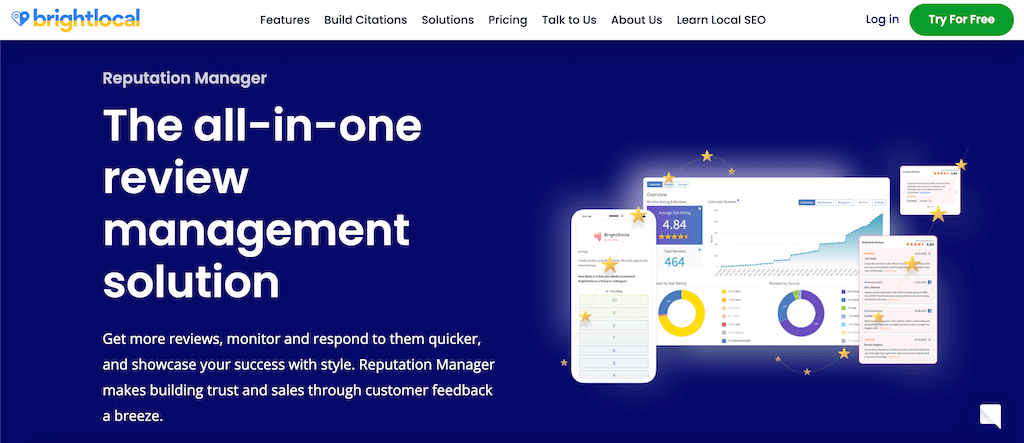
What’s involved?
- Create a platform that gathers reviews and ratings posted across various platforms (Eg: Google, Facebook, Yelp, Trustpilot etc.)
- Display the reviews and NPS on the client’s website for better visibility.
- Set up a reminder sequence to make past customers post a review.
- Monitor and maintain the ratings and reviews posted online. Any negative reviews would need to be immediately addressed and responded to.
- Auditing website referrals and removing reviews that are possibly spam.
Tools you could use
- Podium: platform that encourages customers to leave five-star reviews
- Swell: built specifically for local businesses that lets you set up automatic review requests, send customizable text messages, and use templates to speed up the process.
- GatherUp: helps you build a continuous cycle of customer feedback and reviews through automations and reminder sequences. Connects with up to 30 review platforms including Google, Facebook and TripAdvisor. It provides a kiosk mode that allows users to easily provide feedback on-site.
- Chekkit: more suitable for service businesses. It integrates with Google, Facebook, and other industry-specific review platforms to streamline all reputation management activities.
- Birdeye: Similar to GatherUp and Podium, it provides an all-in-one reputation management software with added features like real-time feedback, surveys, mobile app etc.
Should you offer them all?
Well not necessarily. It depends on what niche you wish to serve, your target audience, the location you want to target and the business model you choose for your local marketing agency.
You will also notice that some of the local marketing services mentioned above are interrelated which suggests that you could package them as an offering.
Ultimately, it depends on what you’re most comfortable getting started with. So what’s stopping you?

